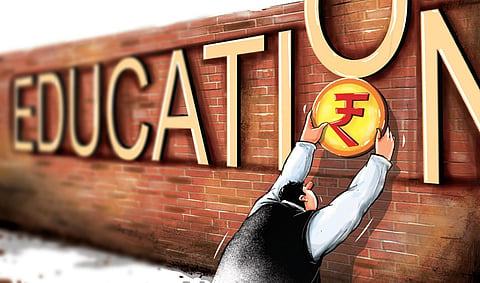

What does the high-sounding United Nations University in Delhi and the Raja Arabic University in Nagpur have in common? Both have been declared fake universities by the central government.
Welcome to the world of counterfeit education.
In Noida NCR’s Khora colony, a sprawling, typically suburban and grimy settlement comprising about 3,275,000 residents, there are scores of such `global’ universities and colleges that claim affiliation to international institutions.
Their students, they assert, can become anything – civil servants, learned doctors or creative engineers – virtually anything.
One such – Education for Commerce and Trade – runs out of a two-room settlement. It barely has a place for prospective students to sit, but boasts of revealing a world to students, who coming from Ghaziabad’s rural district and nearby areas, have seen only on their laptops.
Private colleges such as these, employ teachers with little training, who merrily impart outdated curriculums, and offer no practical experience. Phrases like `holistic learning’, `integrated course’, `Faculty Development Programme’ and the like, are freely bandied around to trap the naïve.
Such private universities and colleges in the country, which run with blatantly fake infrastructure, come in various shapes and sizes. These 'places of learning’ lack teachers and in many cases, even regular students, who don’t worry about attending their classes and make an appearance at the time of examinations, all accounted for. Why just the faculty? Such colleges and universities have no principal or vice chancellors – mostly out of job, underqualified teachers themselves are appointed in higher positions like vice-chancellors, registrars and principals.
Such institutions are not merely fake, money-spinning rackets, but pose a serious threat to India’s promising demographic dividend. That threat is looming larger in the wake of India becoming the world’s most populous country with possibly the youngest population on the planet.
Reporting the phenomenon, the news agency Bloomberg noted: ``It (India) has the world’s largest population by some estimates, and the government regularly highlights the benefits of having more young people than any other country. Yet half of all graduates in India are unemployable in the future due to problems in the education system, according to a study by talent assessment firm Wheebox.”
The agency quoted Anil Sadgopal, a former dean of education at Delhi University and an ex-member of the Central Advisory Board of Education: “Calling such so-called degrees as being worthless would be by far an understatement…When millions of young people are rendered unemployable every year, the entire society becomes unstable.”
In aspirational India, such institutes that number a few million are the talisman needed to get ahead in life. For both, the promoters and the gullible, it is the ideal situation – for obviously different reasons.
Only much later, as it happened in the case of Arindam Chaudhuri’s now-defunct Indian Institute of Planning and Management, did students realize that they had been taken for a ride and the management degrees issued by this so-called management company were a hoax: graduates reporting for interviews seeking high managerial positions, were offered no more than openings of shop floor assistants!
There are many such cases. In August 2022, the University Grants Commission (UGC) released a list of 21 fake universities operating in Delhi, Karnataka, Kerala, Maharashtra, West Bengal, UP, Odisha, Puducherry and Andhra Pradesh.
Said the UGC notification: "Students and the public at large are hereby informed that presently following 21 self-styled, unrecognised institutions which are functioning in contravention of the UGC Act, have been declared as fake universities and these are not empowered to confer any degree."
If anything, the scope of these frauds has magnified with companies looking to recruit in newly-emerging disciplines like electric vehicle manufacturing, artificial intelligence and human-machine interface. It matters little to such colleges and universities that in this age of mega innovation, their tutors continue to impart the basics of the internal combustion engine, which should basically be considered passé in today’s hi-tech world.
So, while the country’s economic engine is purring, with more foreign companies willing to come in and invest in new areas, thereby enlarging the scope for young talent, the skill required for such jobs is lacking. The whole purpose of employment is defeated if expertise is not available in one of the fastest-growing economies in the world. And with employment in the government sector getting strictly regulated, the army of young people sitting on their haunches without opportunities can be potentially explosive.
The Narendra Modi government, aware that its ambitious New Education Policy, 2020, is under threat of being stymied due to such structural and infrastructure deficits, is pushing hard to improve the quality of its institutions. As an important step to deregulate the sector, the government has begun the process of allowing leading foreign universities to set up campuses and award degrees in the country.
The move to `internationalise’ education is to enable Indian students to obtain foreign qualifications at an affordable cost and make India an attractive global study destination. The move will also help overseas institutions to tap into the nation’s young population. It is by no means the first attempt of its kind: the first was in 1995 when a bill was introduced but could not go forward. In 2005-2006, again, the draft law could only reach the Cabinet stage.
Universities that qualify for opening up shops in India should be ranked within the top 500 of overall or subject-wise global rankings. Universities, that have secured subject-wise ranking, will be allowed to offer the same subjects on their Indian campuses. This automatically means that blue chip universities such as America’s Yale, Stanford, Harvard and Britain’s University of Cambridge, and Oxford King’s College could all come in, permitting Indian students to get top-notch education without having to travel. That seems one organized way to get around a degenerative system.
(Ranjit Bhushan is a senior journalist. These are the writer's views.)